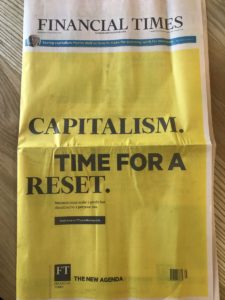
At the end of last week the Financial Times published an extraordinary editorial. While it’s not quite the Communist Manifesto, it’s not what you’d expect from the house journal of the international business elite:
The word ‘neoliberalism’ doesn’t actually appear in the text, but that reference to “reversing the prevailing policy direction of the last four decades” is unmistakable.
It’s not that the FT editorial board has renounced capitalism itself, but clearly they’re calling time on capitalism as we’ve known it since the 1980s. The era that began with Reagan and Thatcher is over, struck down by the coronavirus.
As to what might come next, the FT draws a parallel to the Second World War:
But there we begin to see the FT’s true — and essentially unchanged — agenda. It’s the same globalist, technocratic stuff they’ve always believed in. The precise balance between the respective roles of state and market has been adjusted, but not the underlying value system.
For all the stir caused by the FT’s shift in position, there’s no hint of a true rethink; no doubts expressed about the dangers of hyper globalisation; no regret for what the paper itself has done to further the triumph of Davos Man over the common man.

 Main Edition
Main Edition US
US FR
FR







Join the discussion
Join like minded readers that support our journalism by becoming a paid subscriber
To join the discussion in the comments, become a paid subscriber.
Join like minded readers that support our journalism, read unlimited articles and enjoy other subscriber-only benefits.
SubscribeThanks, you make many good points. For years the FT and the Economist etc have pushed a neoliberal, globalist agenda that suits their friends in finance but makes life miserable for almost everyone else.
And now they are pushing more ‘government intervention’. The fact is that most people want a lot less government intervention and all the arrogance and incompetence – not to mention taxes – that comes with it.
What most people probably want is more ‘localism’, whatever form that may take, but it needs to include devolved powers and taxation, which ought to lead to more accountability.
I realised a long time ago that the FT, Economist and the media in general always gets everything wrong. This is just another example.
What about democratizing the economy; promoting cooperative and employee ownership instead of a cult of CEOs. That would certainly help bringing back a sense of community and local.
Localism is definitely the way forward. Creating an impoverished, nomadic work force was the EU`s single biggest crime against working people.